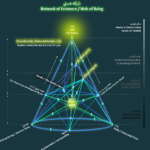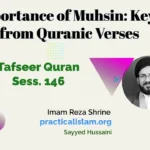Aql, Shariah, Fiqh and their Relations
Expressions and their explanation
Independent Aql[1] (Aql as the Dedicative Force of the Soul (Aql-ul-Tab’[2]))
An internal human force that controls and restrains his desires. Intellect, thought, and feeling are the three sources of knowledge in philosophy. In fact, Aql is the power of discerning good and bad that is embedded in human. This gem can become sharper and more efficient with practice and experience, listening and serving masters. In this application, Aql is considered an independent source from the Qur’an and Hadith. Whenever Aql sees a definite expedient in doing something that is necessary to attain, and it becomes Shar’ii[3] obligatory by referring to this intellectual view. Also, if Aql sees the doing of an action as having an inevitable corruption and is firm in this understanding, it is possible to declare the Shar’ii prohibition of that action based on this understanding.
Dependent Instrumental Aql
This type of Aql helps us in analyzing the things logically in making premises and conclusions. So in this application Aql is not primarily a force of soul but a method.
In this application, Aql is – mainly – a tool at the service of other resources; A tool that can be used to infer legal rulings from sources such as the Qur’an and Hadith; For example, a jurist who infers rulings, after hearing “Aqeemu al-Salat[4]” and after it became accepted that “the appearance[5] of the form of the command is the obligation i.e. Wujūb[6]” and “the authenticity of appearances”, uses his Aql and concludes “the legal obligation of Salāt”. In this situation, the role of Aql is to logically arrange the minor and major premises and form the analogy. In this application, the Aql is a perceiving force that reaches a general problem and causes a transition from known things to unknown things. In this usage, the word Aql corresponds to its logical term.
Shari’ah
The delivered rules from Allah to his Vicegerents through Qur’an and authentic Hadith
Fiqh
It is a method by which we obtain Shari’ah rules from detailed proofs. According to most Muslim scholars, “detailed reasons” are: Quran, Sunnah, Ijmaa’ and Aql. Fiqh issues the final ruling in two ways:
- Daleel Ijtihadi: This is a Daleel that indicates the real ruling. Because this Daleel leads to Dhann (almost-certain (of the real ruling, it is called the Daleel of Ijtihad. Imarah is also called the Daleel Ijtihadi. The Daleel for ijtihad is related to the inference of real rulings, which consist of the Qur’an, Sunnah[7], Ijmaa’[8] and Aql.
- Daleel Fiqāhati: The rules that clarify the practical duty of the Mukallaf[9] in cases of doubt in the determination of the Shari’ah ruling, after there is no Daleel or evidence. Therefore, the subject of such Daleel is doubt.
The relationship between Fiqh and Shari’ah
With the definition we provided of these two words, the relationship between these two concepts became clear. In the definition, it became clear that Fiqh is the discoverer of Shari’ah. As the claims of jurists and the existential philosophy of Fiqh are also the same. Of course, insisting on the discovery[10] of Fiqh does not mean that Fiqh is always and on all grounds the accurate discoverer of Shari’ah and there is no error in that way! Rather, it means that Fiqh brings the jurist to the real Shari’ah in many cases, and in some cases he goes wrong and does not place the real Shari’ah at the disposal of him and his Muqallids[11], but also in the matters of error, the result of this movement of Fiqh and jurist is valid and can be cited.
The scope of Aql in issuing and infering rules
No one has said that Aql not in its first sense nor in the second has no role in deriving the rulings of Shari’ah. However, there is a long distance between Salafism and the inability of Aql in deducing many rulings out of religious propositions independently.
As in deducing the Manāt[12] and validation of religious laws:
Takhreej ul-Manāt[13] with the help of Aql is difficult but almost impossible unless the Shari’ah mentions them. For example, Aql alone has no way to find the reason for the Wojoub of Salat and the number of Rak’ahs, or the Hurmah of eating pork, and almost all religious rules.
A Shari’ahh-oriented Aql is a validator of the Shari’ahh. By understanding generalities, Aql can understand commonalities between issues, also some benefits and harms. If we look at religion, we will find traces of these rational propositions. This is why it is said that whatever Aql dictates, Shari’ah also dictates it and vice versa. In this regard, refer to the first volume of the book of Sheikh A’zam Ansari’s Rassaa’el to know more precisely the relationship between Aql and Shari’ah.
In addition, most of the propositions that are confirmed by Aql are mentioned in the Shari’ah in some way, of course, referring to them can have several reasons, including ensuring certainty of heart.
Therefore, what is Aqli with the first sense is also present in the text of religion, even though it can understand and confirm them independently. But in any case, it is also mentioned in religious texts.
In any case, in the following example, the scope of Aql is almost determined. In Fiqh and Shari’ah, the Aqli Daleel (in its first sense) is used independently as the last reason, because religious propositions and Fiqahati reasons are sufficiently available to the obligee and Mujtahid.
Pathology of the efficiency of Aql in inference
The necessity of using Aql in deriving rulings is one side of the coin. Taking advantage of Aql, if it is not technical and does not have the logic of inference[14] (strong principles of Fiqh) and is carried out by neglecting the Shari’ah rules and valid Shari’ah texts, i.e. the collection of the Shari’ah with its goals and documents (texts showing the purposes and texts showing the rules) it causes irreparable damage to the system of inference, it presents a set of illusions, personal preferences and customs of the people in the name of Shari’ah, and it destroys the treasure of suffering of thousands of jurists for many centuries. What was expressed is not an expression of a feeling. It is a fact that can be seen every day and everywhere.
The titles of some of these damages are:
- Relying on personal approval and suspicion;
- Improper use of Aql;
- Mistake between the wisdom of the ruling with its subject;
- Extreme expediency by taking advantage of Aql and stepping into the abyss of utilitarianism, Machiavellianism, Bid’ah, secularization of religion, dilution of Shari’ah and finally removing it from the scene of individual and social life;
- Collapse of Aql to temporary and formal materials and neglect of the basic elements;
- Negligence in paying attention to the accessories, comparisons, and future consequences of what is called Aqli understanding;
- And…
Fiqh as a Method
Our claim is that the Shari’ah is perfect and has brought to mankind all that is needed to know from good and evil for individual, social, physical and spiritual life. But this does not mean that we have infered and discovered everything from the heart of this Shari’ah in the form of Fiqh, either in the form of propositions or in the form of systems and models. But jurists have done a lot of work in both fields and new data and findings are discovered every day because the nature of knowledge is gradual discovery.
This is what we call it the difference between the world of “Thobout[15]” and the world of “Ithbaat[16]“. It is proven that both Shari’ah and Fiqh have the ability to solve all human problems and meet his issues because of:
1. Various propositions of the Qur’an in the comprehensiveness of religion
2. Wide variety of traditions regarding the deeds of Mukallaf (Obligee) (when Imam Javad a.s. determines the place of cutting off the thief’s hand from a verse of the Qur’an, or when he derives three hundred Fiqhi rules from one rule (his debate with Yahya Ibn Aktham), also with the three thousand Shar’ii propositions that exist and can be taken into account, what reason do we have for the inability of Fiqh to definitively resolve issues?)
3. The endeavors of Jurists and their success in solving issues during times.
Shari’ah essentially has the capacity to meet all essential needs, issues and problems of man, and Fiqh has methodically has met many issues, and Faqeehs[17] are updating their knowledge day by day from verses and hadiths. What is clear is that today’s Fiqh has made a lot of progress compared to the Fiqh of the past, firstly, and secondly, when we look at it from a comparative point of view, in terms of government, psychology, family and child-rearing, and many issues, this very Fiqh is far more successful than western knowledge which. Has Freudian psychology succeeded in educating people? Have western government systems based on the philosophy of Kant and Hegel been successful in their governance that was based on colonialism?
When we talk about Fiqhi method, it does not mean that if we do not have a text in religion and Shari’ah, the Fiqh is null and void. Rather, Fiqh still has a method for cases like smoking for which there is no text. Here we must refer to a fundamental issue: if there is a Shari’ah reason, we go to it, which is called “Ijtihadi Daleel”, but if we do not have a text, we go to a secondary reason called “Fiqahati Daleel”. The latter is in a general category of 4 types: Bira’ah, Ihtiyaat, Takhyeer, and Isstisshab. All these are Fiqh and are used in Fiqhi method. It is interesting to know that we even have traditions for these Fiqahati Daleels. As you can see, Fiqh has orders and methods for all issues, even those that are not included in religious texts directly. But this does not mean to abandon the Aql in any way, but the Aql has a certain role that must be properly explained. We do not act like Western rationalist philosophers, nor are we just like Salafists and Akhbaris.
When a Faqeeh is faced with a problem, he first goes to Ijtihadi Daleel. Either he finds it or he doesn’t (in most cases he does). If he finds it, he does Istinbaat according to the Fiqhi method, and if he does not find it, he goes to Fiqahati Daleel and again does Istinbaat according to the Fiqhi method.
Sometimes we put Aql beside Wahi and say that Wahi has nothing to say in this matter and we should go to Aql. This is definitely a mistake and causes the degradation of not only Fiqh but also Shari’ah.
Sometimes we basically leave Aql aside and go for Wahi. This is also wrong for various reasons, such as the fact that in cases where there is no religious text about an issue, we go to Qiyass and Istishan (just like Sunni Fiqh).
But sometimes we place Aql not next to Wahi but as a way in Fiqh. Of course, when we look at the Fatwas of the Mujtahids in terms of practice, we see that it is not the case that Aql can match the Qur’an and Sunnah in Fiqh. Rather, it is only a helper. This is the method of Shia Fiqh.
A Practical Example
Now we will implement this issue in an example to get more familiar with the Fiqhi method and the place of Aql and Wahi in it. All is a Fiqhi process.
In the matter under discussion[18], not only is it not merely Aqli, but it is not even Fiqahati because we have an Ijtihadi Daleel for it.
Now Faqeeh’s method in solving the mentioned problem is something like this:
The Faqeeh searches the religious texts for any proposition which directly or indirectly is about the subject matter. Then he puts together the Shar’ii propositions about obedience to parents and husband as well as other Fiqhi rules and finds a general Shai’ah ruling and eight other rulings.
The general Fiqhi rule from the Shari’ah (religious) texts is:
It is Wajib for a woman to be obedient to her husband in intimate relation with him and leaving the house.
On the other hand, we have other Fiqhi rules (based on Shari’ah and Aqli rules) that can be in conflict with this general rule:
- It is Wajib to save the life of oneself and the others
- We have no Haraj (extreme difficulty) in religion
- Learning religious obligations is Wajib
- Treatment of illness is Wajib
- Oppression and litigation are Wajib
- Making a living is Wajib
- It is Wajib to comply with the terms of marriage
- It is Wajib to perform objective obligations such as Hajj
As you can see, here we have a general ruling that is derived from the religious texts, as well as other specific rulings that are all part of our religious texts, and Aql cannot independently understand many of them and their priority, but with the help of religious propositions. Then Faqeeh in a process containing prioritizing, exceptionalizing, etc judges as follows:
Authentic Hadith (Daleel Shari’ah) says … وَ لَا تَخْرُجَ مِنْ بَيْتِهَا إِلَّا بِإِذْنِهِ وَ إِنْ خَرَجَتْ بِغَيْرِ إِذْنِهِ لَعَنَتْهَا مَلَائِكَةُ السَّمَاءِ وَ مَلَائِكَةُ الْأَرْضِ وَ مَلَائِكَةُ الْغَضَبِ وَ مَلَائِكَةُ الرَّحْمَةِ حَتَّى تَرْجِعَ إِلَى بَيْتِهَا… which connotes the Wojoub of her permission from her husband in going out of house (Fiqhi), also because of the authority of the husband over his wife and life (Fiqhi). On the other hand, her parents order her to take care of her sister who is ill (customary proposition) and it is forbidden to disturb my parents (Fiqhi). Saving human life is Wajib (Fiqh). Now I know that saving the family is also very important (Fiqhi), but if the saving of my sister’s life depends on leaving the house without the consent of my husband, it is Wajib for me to do this because saving her life has a high rank in the eyes of God (Fiqhi) unless another person can really take care of him (Fiqhi and Aqli). And as for the conflict between obeying the husband and parents, obeying the husband in what is his right is prior to obeying parents (Fiqhi).
Also with the analysis of the Shar’ii and Fiqhi propositions related to obedience to the husband, he understands two reasons for her obedience to her husband:
- Avoidance of moral corruption
- Avoidance of family corruption
That is, if there is no fear of any of these two corruptions, a woman can leave the house without her husband’s permission, especially when there is a higher priority.
This is a very simple example of Fiqhi method in deriving a ruling out of Daleels. In any case, the result is whether or not the wife goes to her sister’s house without her husband’s permission to take care of her.
As you can see, the inference of the Fiqhi method is a solid and precise one, which consists of many Shar’ii and Fiqhi propositions to the extent that Aql does not have a high place in the inference of the ruling.
[1] reason, intellect
[2] عقل الطبع
[3] Religiously legal
[4] اقیموا الصلاه maintain the prayer
[5] Dhaahir
[6] obligation
[7] traditions
[8] Consensus of the Fuqaha’
[9] obligee
[10] Kashifyyah
[11] obligee
[12] Illah or cause
[13] Inference of the cause of A ruling
[14] Istinbaat
[15] reality
[16] idea
[17] jurists
[18] The scope of obedience of wife to her husband








